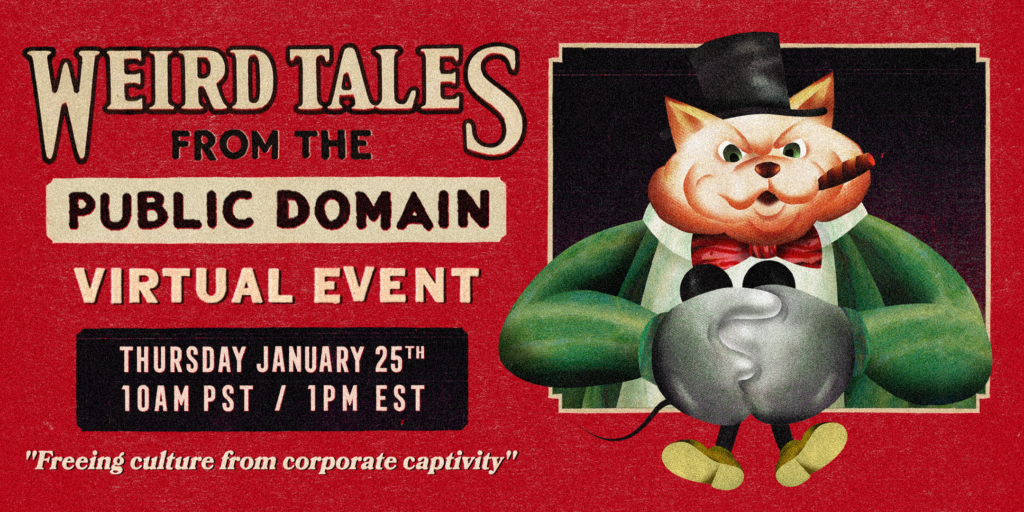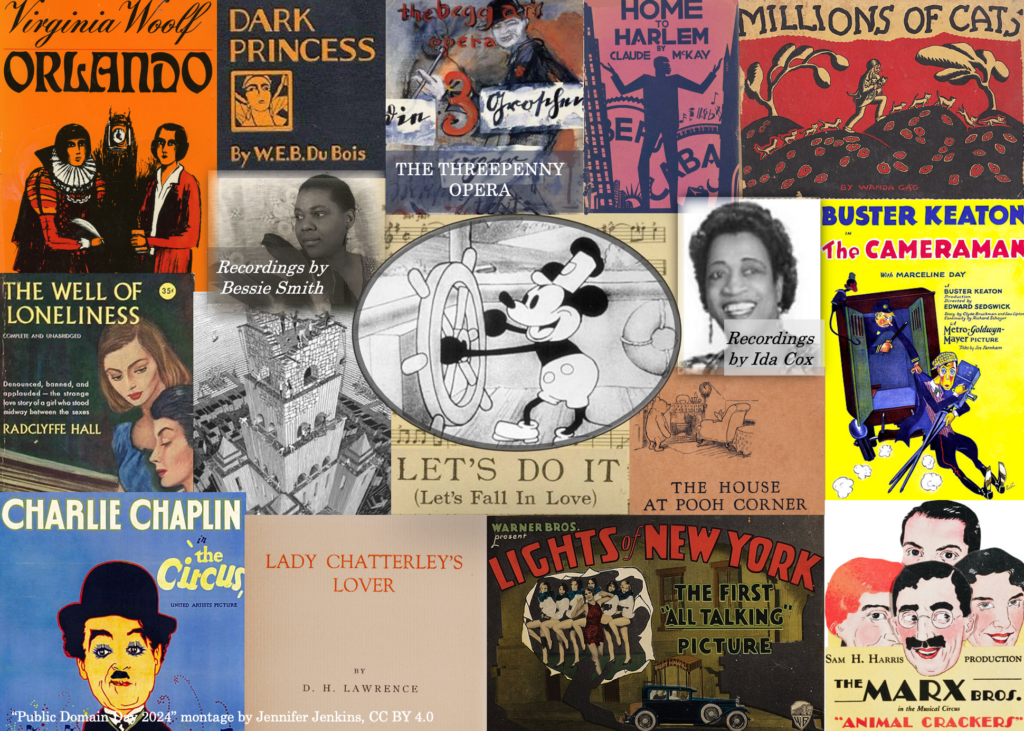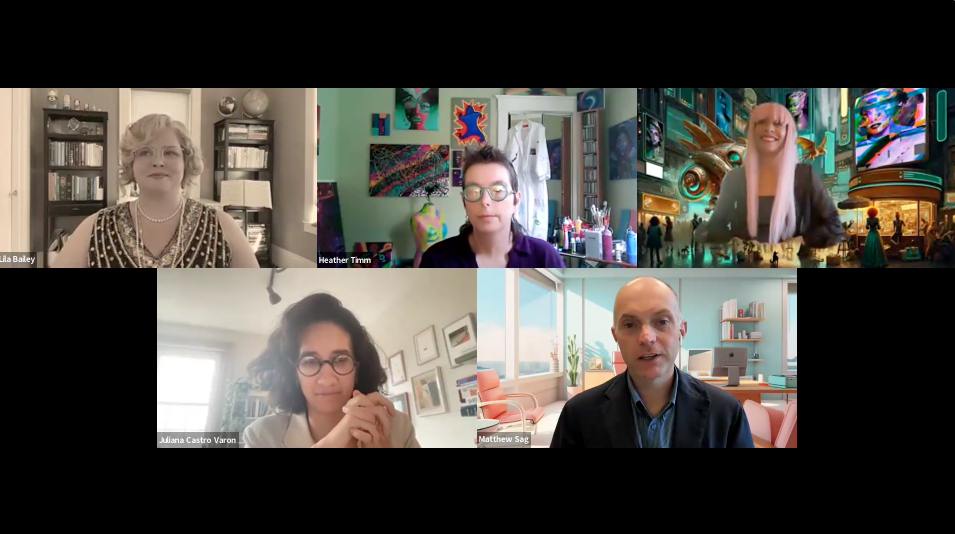
Hundreds of people from all over the world gathered together on January 25 to honor the thousands of movies, plays, books, poems and songs that recently entered the U.S. public domain.
Steamboat Willie, Walt Disney’s 1928 animated film featuring Mickey Mouse, had top billing at the virtual event. Literature now free from restriction for reuse includes Orlando by Virginia Woolf and Tarzan Lord of the Jungle by Edgar R. Burroughs. Sound recordings from 1923 (released on a different schedule) joined the public domain such as ”Down Hearted Blues” by Bessie Smith and ”Who’s Sorry Now” by Isham Jones Orchestra.
WATCH RECORDING:
“There’s so much to rediscover and to celebrate,” said Jennifer Jenkins, director of the Center for the Study of the Public Domain at Duke Law School. For example, the release of The Great Gatsby into the public domain in 2021 inspired a creative flurry — new versions of the novel from the perspective of different characters, a prequel telling the backstory of Nick Caraway, a young adult remix, and song. “From the serious to the creative, to the whimsical to the wacky, these are all the great things we can do…now that [these works] are in the public domain and free to copy, to share, to digitize and to build upon without permission or fee.”

For an overview of new works in the public domain, view the curated list from the Center for the Public Domain.
Remix Contest
The winning film from the Public Domain Day 2024 Remix Contest was shown as well: “Sick on New Year’s,” by Ty Cummings. Every year since 2021, this contest has invited artists to remix works from its collection to showcase new and creative uses of public domain materials. Fifty films were submitted to this year’s competition, according to Amir Esfahania, artist in residence at the Archive. Learn more about the finalists or watch all the submissions in our recent blog post.
Advocacy
“Celebrating the public domain is not just about vintage references and period-appropriate clothing. It’s about understanding history to inform the present day,” said Lila Bailey, Internet Archive senior policy counsel and co-host of the virtual festivities. “We think there should be time set aside every year to celebrate the immense riches that free and open culture provides to everyone.”
While federal holiday recognition (like MLK Day or Presidents’ Day) for the public domain is unlikely, there was a discussion of an advocacy campaign for establishment of a commemorative Public Domain Day (more along the lines of National Data Privacy Day or National Whistleblowers Day).
“It only requires a simple resolution in the Senate with high chances of recognition,” said Amanda Levendowski, director of Georgetown Law School’s Intellectual Property and Information Policy Clinic. “Prospects for passage are way better than possible. About 80 percent of proposals are passed — and maybe next year, Public Domain Day will be among them.”
Experts said a successful drive for the designation will require a collaborative effort. A kickoff event will be held February 29 in New York City, hosted by Library Futures, executive director Jennie-Rose Halperin announced.
AI and the Public Domain
The online program also featured a panel discussion on generative artificial intelligence, copyright and artist expression. Experts weighed in on just what should be the copyright status of the outputs of generative AI.

Now, AI tools can turn text or simple descriptions into images that are genuinely new and often look like exactly the kind of things that people get copyrighted if a human made them, explained Matthew Sag, professor of law, artificial intelligence, machine learning, and data science at Emory University.
“The copyright office is quite clear that to get copyright, you have to have human authorship. So something created entirely by an unsupervised machine is not eligible for copyright,” Sag said, noting that the courts have recently agreed. “The interesting question is what about when humans are using AI as a tool and directing the output. This is where the controversy really is.”
On the panel, two artists, Heather Timm and Maxximillian, shared how they both leverage AI in the creative process.
Timm said she started using generative AI in 2021 and thinks the copyright office should cover works that have results from it. She has trained AI models on her own physical work and then created something new collaborating with the machine, as well as conceptualized how to blend different pieces of work in a collage or sculpture.
“I use it almost as a notebook,” Timm said. “If I have a concept or an idea about something on the go, I can immediately prompt that and have it as a placeholder to explore it later.”
As a filmmaker and musician, Maxximillian said she feels passionate about AI and it has saved her time creating animated characters and helping refine her text. “As a professional artist, I rely on copyright to keep viable the works that I produce for clients legally,” said Maxximillian. “It’s important to understand that copyright protection enables the creator to be a steward of that work. The question to consider: Who benefits by denying copyright on AI? I think nobody benefits.”
An open access publisher, Juliana Castro Varón, design director and founder of Cita Press, also addressed the issue. “I believe that AI may pose economic, power, and labor challenges, but I feel very confident that creativity will survive technology,” she said. All books Cita produces are in the public domain for everyone to download. “We are not at all against people using AI for their work, but we continue to hire humans…elevating the work of people is core to our mission.”
***
The event was co-hosted by Internet Archive and Library Futures with support from Creative Commons, Authors Alliance, Public Knowledge, SPARC and Duke Law’s Center for the Study of the Public Domain.
As a filmmaker and musician, Maxximillian said she feels passionate about AI and it has saved her time creating animated characters and helping refine her text. “As a professional artist, I rely on copyright to keep viable the works that I produce for clients legally,” said Maxximillian.
Will the panel discussion video be online? I’d love to share that with people. Thanks!